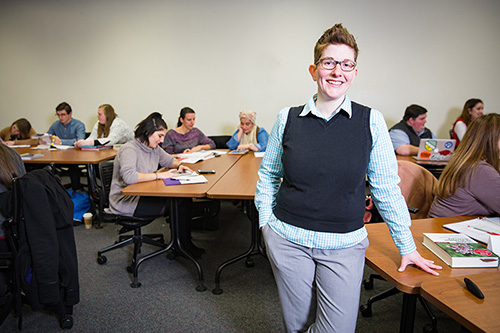
Two national organizations recently recognized University of Arkansas faculty member LJ Shelton. A clinical assistant professor of higher education, Shelton was selected by NASPA, which is the Student Affairs Administrators in Higher Education, to participate in its Emerging Faculty Leader Academy.
The one-year program is designed for faculty members who want to gain knowledge, techniques and experience in order to develop and sustain a fulfilling faculty career.
Shelton also was elected to a three-year term as a member of the ACPA (College Student Educators International) Commission for Professional Preparation.
The members of this commission work closely with faculty in the student affairs and higher education graduate preparation programs across the country to examine the recruitment of new professionals and make recommendations for curriculum improvement.
Shelton, who coordinates the higher education master's degree program at the U of A, earned her doctorate in higher, adult and lifelong education from Michigan State University. She earned a master's degree in college student personnel and a bachelor's degree in sociology and criminology, both from Ohio University. It was during her undergraduate days that Shelton discovered the career field of student affairs within higher education through her involvement as a student leader and campus employment experiences.
"There's something magic about being on a college campus, surrounded by so much energy in a spirited environment where people are pursuing their passions, exploring ideas, and engaging in pursuits that can lead to transformational life experiences," Shelton said.
Educators in the student affairs field work to facilitate these experiences for students, she said. They work mainly in the co-curricular role of college campuses where learning and development occur outside the formal classroom. This could include functional areas such as admissions and orientation, multicultural services, housing and residence life, academic advising and senior level campus leadership such as dean of students or vice president of student affairs.
"Student affairs educators play an important role in serving students and helping create a holistic, developmental experience for them in college," Shelton said. "I get to work with our rising stars in the field as they study this discipline and, in turn, they apply classroom learning to practice where they help shape positive experiences for the students with whom they work."
Shelton said many student affairs educators supported her as a first-generation college student.
"I had the opportunity to work with various functional areas ranging from residence life to admissions, a women's center, LGBT resource center and outdoor campus challenge course facilitation," she said. "Throughout these experiences, working in student affairs allowed my passion for social justice to blossom, and later my doctoral journey allowed me to further explore this focus as a scholar and teacher. I am proud to be a part of a field that explicitly includes social justice and inclusion as a core value and underlying philosophy of our work with students."
The field encourages room for personal and professional growth and exploration, and Shelton said getting involved in professional associations such as ACPA and NASPA is helpful in many ways.
"These organizations offer professional development, including ways to stay up to date on scholarship and innovative high-impact practice, as well as opportunities to meet new people and make connections with other educators around the world," she said. "I am enthusiastic about welcoming new students and colleagues into organizations such as ACPA and NASPA because it is so motivating to find your fit in a community of scholars and practitioners who are dedicated to working together to best serve our students."
Contacts
Heidi S. Wells, director of communications
College of Education and Health Professions
479-575-3138,